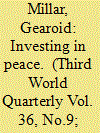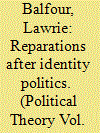| Srl | Item |
| 1 |
ID:
155137


|
|
|
|
|
| Summary/Abstract |
Treating the threat of climate change in the Caribbean as a case study instructive for responses globally, this article examines the social and political relations of climate change. It argues for an analysis taking into account the ways in which the histories of imperialism and colonialism have shaped contemporary global ‘development’ pathways. The article charts how Caribbean vulnerability to temperature rises of more than 1.5°C of warming comprise an existential threat structured by contemporary social relations that are imperialist in character. Hope can be taken from a politics of climate justice which acknowledges the climate debts owed to the region.
|
|
|
|
|
|
|
|
|
|
|
|
|
|
|
|
| 2 |
ID:
113820


|
|
|
|
|
| Publication |
2012.
|
| Summary/Abstract |
In analyzing peace processes in postconflict societies, scholars have primarily focused on the impact of prosecutions, truth-telling efforts, and reconciliation strategies, while overlooking the importance of individual demands for reparations. The authors argue that normative explanations of why reparations are granted in the aftermath of regime change are useful in understanding a need for reconciliation, but inadequate for explaining victim demands for compensation. The authors extend this research to study civil war settlement. In the aftermath of civil war, when some form of reparation is offered giving individuals the opportunity to seek redress of grievances, what types of loss and political and socioeconomic characteristics are likely to lead some individuals to apply for reparations but not others? Using primary data, collected through a public opinion survey in Nepal, the authors investigate individual-level demand for reparations. The findings suggest that understanding loss and risk factors may be important to civil war settlement and reconciliation.
|
|
|
|
|
|
|
|
|
|
|
|
|
|
|
|
| 3 |
ID:
141139


|
|
|
|
|
| Summary/Abstract |
In peace-building and transitional justice literature economic restoration is considered central to sustainable peace in post-conflict societies. However, it is also widely recognised that many post-conflict states cannot afford mechanisms to provide restoration. Not only are many such states poor to begin with, but violent conflict further degrades their economic capacity. As a result, in their need to provide jobs, generate tax revenues, spur development and promote sustainable peace, many post-conflict states turn to alternative processes of economic restoration. This paper examines the potential for foreign direct investment (FDI) to serve as one alternative means by which to provide economic restoration in post-conflict states. Presenting findings from six months of fieldwork evaluating one such project in rural Sierra Leone, the paper describes how local people experience such projects and explores whether employment and land-lease payments can provide experiences of economic restoration so far unforthcoming from the state.
|
|
|
|
|
|
|
|
|
|
|
|
|
|
|
|
| 4 |
ID:
067399


|
|
|
| 5 |
ID:
190839


|
|
|
|
|
| Summary/Abstract |
In states emerging from mass violence and human rights abuses, do individuals prefer retributive punishment of perpetrators through trials, or do they wish to be compensated with land or monetary reparations for their injuries? How does the concrete option of prosecutions by the International Criminal Court (ICC) moderate these preferences? Using unique survey data from 507 Kenyans collected in 2015, we build on and add nuance to the empirical literature that interrogates the link between exposure to mass violence and post-conflict justice preferences. We find that while some individuals prefer reparative justice, victims and witnesses generally want perpetrators to be prosecuted. Even for those who are co-ethnics of government leaders – who allegedly instigated widespread killing, sexual assaults and displacements – direct exposure to those acts leads to greater desire for prosecutions. We further find that one’s personal experience with violence also leads one to reject domestic justice in favor of international justice: victims and witnesses who favored retributive justice are highly likely to believe that the ICC is the best option for prosecuting perpetrators.
|
|
|
|
|
|
|
|
|
|
|
|
|
|
|
|